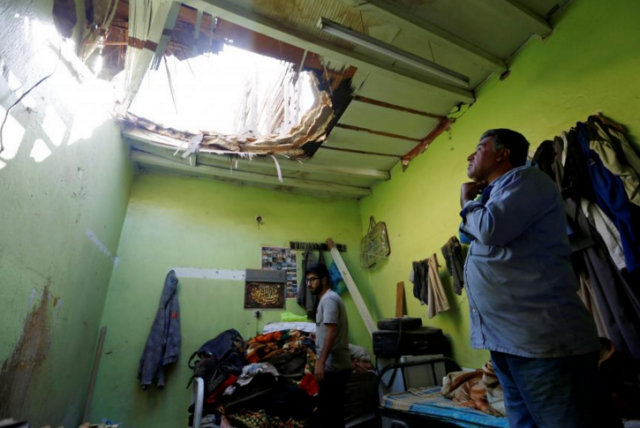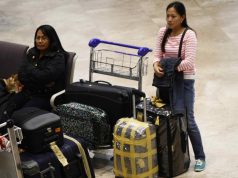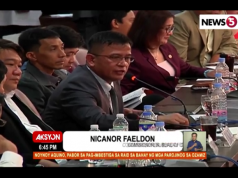
MANILA – A party-list representative advocating OFW causes has drawn the attention of authorities to the renewed risk to Filipino workers in Saudi Arabia of the latest missile attacks by Yemen’s Houthi militia on Sunday, killing one Egyptian worker and wounding two others.
Saudi air defenses shot down seven ballistic missiles fired by the Houthis. The Egyptian worker, identified as 38-year-old Abdul Muntaleb Ali, was sleeping on a thin blue mattress on the floor beside three others, when debris from a ballistic missile fired by the Houthi militia group crashed through their roof shortly before midnight on Sunday.
The house had been shared by 16 Egyptian construction workers.
His was the first death in the capital during the Saudi-led coalition’s three-year military campaign in Yemen.
Saudi forces destroyed three missiles over northeastern Riyadh shortly before midnight, as well as others fired at the southern cities of Najran, Jizan and Khamis Mushait, the coalition said in a statement carried by state news agency SPA.
In Manila, ACTS-OFW Rep. Aniceto ‘John’ Bertiz III denounced the multipronged missile strike on Saudi Arabia, saying the attack endangered the lives of Filipino workers in the world’s largest oil producer.
“There are over 1.2 million Filipinos working in Saudi Arabia. Any projectile that is not intercepted by the Saudi air force is bound to put in harm’s way the lives of our workers there,” Bertiz said Monday.
In the capital city of Riyadh alone, over which three missiles were intercepted by the Saudi air force, there are more than 400,000 Filipino workers, Bertiz noted.
The Saudi military said it captured in the air seven inbound ballistic missiles Sunday evening, including three aimed at Riyadh.
Bertiz acknowledged that Saudi Arabia, besides hosting a large number of Filipino workers, is also a strong ally of the Philippines in the war on terror.
He noted Saudi Prince and Interior Minister Abdulaziz bin Saud bin Naif visited Manila and met with President Rodrigo Duterte just last week.
“Prince Abdulaziz was here partly to reassure our President that Saudi Arabia is looking after Filipino workers in the kingdom, and also to discuss ways to strengthen cooperation in the fields of defense and security, especially in the war on terror,” Bertiz said.
THIRD ATTACK IN 5 MONTHS
Reuters reporters in Riyadh heard several booms and saw smoke in the air. Another witness said he saw a long stream of light followed by additional explosions.
In al-Malqa neighborhood, emergency personnel gathered near a crater in the ground and inspected shattered glass in nearby homes.
The attack marked the third time in five months that missiles have flown over Riyadh, as the Houthis step up efforts to demonstrate they can reach the Saudi capital, and threatened to escalate a regional rivalry between Iran and Saudi Arabia.
The Houthi-run SABA news agency reported the group’s missile force had targeted King Khalid International Airport in Riyadh with a Burkan H2 missile.
The group also fired other types of missiles at airports in Jizan, Najran and Abha, another southern Saudi city, according to the SABA report.
The Saudi-led coalition of Gulf Arab states launched military operations against the Houthis in Yemen in March 2015, after the Iran-aligned Shi’ite militia seized the Yemeni capital Sanaa and forced President Abd Rabbu Mansour al-Hadi to flee.
Riyadh saw the ouster as a regional power grab by arch-foe Iran, although the Houthis deny any help from Tehran, and has described Iran’s alleged supply of rockets to the Houthis as “direct military aggression.”
The United States, which provides support to the coalition, has also displayed what it said were Iranian-made weapons supplied to the Houthis, calling them conclusive evidence that Tehran was violating UN resolutions.
The conflict in Yemen has killed more than 10,000 people and displaced more than 2 million, unleashing a humanitarian crisis in the Arabian Peninsula’s poorest country. Nearly 1 million people have been infected with cholera.
Coalition forces have made modest territorial gains over the course of the war but appear far from seizing back the capital.
The home where the lone fatality was reported Sunday night in eastern Riyadh had been shared by 16 Egyptian construction workers.
One of them, Khattab Jalal, 27, told Reuters the sound of explosions jolted him awake.
An enormous hole had opened in the peeling green-painted ceiling of their home, which was filled with smoke and debris. Jalal and the others ran outside, but realized that one of their housemates, Abdul Muntaleb Ali, was not with them. They realized later that ali had been hit by debris and killed.
Three of Ali’s roommates, one of whom was his brother, were wounded in the attack, Jalal told Reuters the following morning.
Ali’s fate sounded much like that of OFWs in the Middle East.
“For three years he (Ali) didn’t leave (Saudi Arabia). He hasn’t seen his kids,” Jalal said. “You’re with your friend and you’re having dinner together – and a few hours later, you wake up and find him dead.”
Saudi forces destroyed three missiles over northeastern Riyadh late on Sunday, as well as four others fired simultaneously at the southern cities of Najran, Jizan and Khamis Mushait, the coalition said in a statement.
ANNIVERSARY OF SAUDI-LED INTERVENTION
The attacks, which coincided with the third anniversary of the Saudi-led intervention in Yemen, marked a sharp escalation in the conflict and stripped away the sense of calm in a city that, until recent months, had never quite felt at war.
Haila Zayed, a 27-year-old Saudi, clutched her infant son in a panic when she heard the explosions overhead. She could feel the car shaking as her husband drove.
“I always enjoyed the safety and security in my country. For the first time I felt the kind of fear that people have at war,” she said. “May God protect our country and keep it safe.”
For its part, the Saudi-led coalition has carried out thousands of air strikes in Yemen since launching operations after the Houthis, allied with Iran, seized the capital Sanaa and forced President Abd Rabbu Mansour al-Hadi to flee.
Discussion of Sunday’s missile attack flooded Twitter on Monday, with pleas to keep Saudi Arabia secure and condolences for Ali topping the list of trending hashtags in the kingdom.
Many prominent Saudis, including newspaper columnists, clerics and members of the advisory Shura Council, urged people not to share videos and photos of the attacks, saying they would feed into Houthi propaganda.
In malls, cafes and supermarkets around Riyadh, Saudis digested the escalation in their own ways.
For Abdulrahman al-Sari, who lives in Riyadh but hails from the frequently targeted southern province of Najran, the situation was too familiar to faze him. “For me it was normal,” he said with a shrug. “We’re used to it.”
Others emerged from the experience chastened and defiant.
“I want to pick up a gun, put on a uniform and go join the brave Saudi soldiers stationed on the border,” said Fahad Matar al-Shelahy, a student at a technical college in Riyadh.
“If they give orders for people to join the soldiers, I will be the first. We all wish to be martyrs defending our country.”







